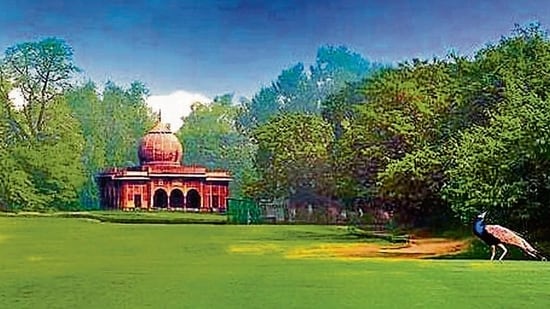Rajnath Singh, the rakhi mantri, even a little shocked that the Kasauli Club, whose chairman is the serving general of the cantonment, may also prevent him from entering the Club. The Club, which was established in 1898, also maintains an outmoded dress code that permits men to enter wearing tours, blazers, and lounge suits, but not what is the minister’s amazing brand attire, an elegantly worn sari with a pleated kurta. He may find it difficult too because the Club even insists only on boots with boots, and prohibitions shoes, yet closed Peshawaris.
 PREMIUM
PREMIUMOur European leaders set up a string of clubs for themselves, and for longer, they were for “whites simply”. When they left, Indians were admitted, but generally “brown sahibs”, who were, as Macaulay had ominously predicted, Indian only in color. This class of anglicised, English- speaking Indians was also the innovative power elite — members of the legal services, older police and Army officials, the ancient abundant, and some leading business figures.
Thus, nothing really changed in these exclusionist bastions. The Bengal Club in Kolkata, where Macaulay once resided, opened its doors to Indians only in 1959, more than a decade after independence, and an Indian did not replace a British citizen as club president for another seven years! After 1947, another important club in Mumbai kept this notice outside of its buildings: DOGS AND INDIANS NOT ALLOWED.
Such clubs have, therefore, become today the symbols of a cultural confrontation, between a new, less anglicised and more egalitarian India, and the colonial traditions of the past. The Delhi Gymkhana Club, founded in 1913, occupies 27.3 acres of prime land in Lutyens Delhi. But in 1991, when I went to the club, wearing a silk kurta, starched pyjamas, expensive buttons, and Peshawari sandals, I was asked by the burly doorman who had known me since childhood, to wear a Jawahar jacket as well. I agreed until I realized that only people in jeans and T-shirts could enter, whereas I could only wear formal attire in my own cultural customs. I protested strongly, and fortunately, the then president, Admiral Tahliani, revised the rules.
But old habits die hard. A high-ranking Bhutanese monk was prevented from entering in 2013 by the same club because of his customary attire. The Delhi Golf Club, another elite citadel, had a shameful incident in 2017 when a Khasi lady from Meghalaya, Taiin Lyngdoh, invited there for lunch, was asked by club officials to leave because she was dressed in the jainsem, her state’s formal attire. Apparently, the officials told her that it looked like a “maid’s dress”. The incident created public outrage, but colonial mentalities persist, and little attempt has been made to accommodate India’s vast formal sartorial diversity. For instance, the well-known Tollygunge Club in Kolkata, which was established in 1855 and consists of 110 acres of prime land, does not permit a guest or member of the club who is formally clad in pyjama-kurta in any of its venues but does permit all types of T-shirts and jeans. If former minister P Chidambaram was dressed up in his stylish veshti and shirt, it wouldn’t be permitted.
I am a member of most of these organizations, and my criticism comes from an insider who offers cautionary counsel on the need to change, especially since the majority of the current ruling party’s members, without an anglicized pedigree or English-language felicity, would not qualify to join, and it is understandable that they dislike these remnants of cultural colonization. Due to inbreeding leading to infighting, the situation gets worse. As has happened with the Delhi Gymkhana Club, allegations of financial irregularities between rival clubs in the clubs flutter around, literally urging the government to take control.
Venues are entitled to their freedom, but not to their refusal to alter. It is not coincidental that after the government takeover of Gymkhana, Om Pathak was appointed the administrator. A member of the Bharatiya Janata Party national executive, he had applied for membership as far back as 1982 but never got it. Two of his decisions were to keep an open copy of the Bhagavad Gita in the library and have a performance of the Ramayana.

